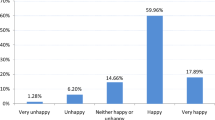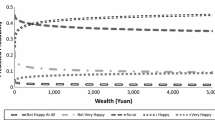Abstract
Several studies have been conducted on the topic of well-being. Most of them, however, have been done in industrialized countries where income is distributed relatively more equitatively and the population tends to be more homogeneous. This paper studies the relationship between subjective and economic well-being in Mexico, a country where the economic differences among the population are more clearly marked.
According to the economic definition of well-being, higher levels of income are associated with higher levels of well-being through greater levels of material consumption. Taking into consideration this definition, it is worth asking just how important income is for an individual's happiness?Existing studies in psychology have found a positive correlation between economic well-being (socioeconomic status) and subjective well-being (happiness). However, this positive relationship is weak and a large percentage of human happiness remains unexplained.
Although the mentioned studies make a good approximation of the existing relationship between income and happiness, the characteristics or specification of the function that generates the relationship between these two variables is often assumed to be linear and positive. The main objective of this paper is to investigate further the relationship between subjective and economic well-being. In this study different specifications and approaches are used to approximate the relationship between these variables.
An empirical analysis is made from the results of a survey conducted in two Mexican cities. The investigation studies the impact of demographic, social, and economic variables on subjective well-being in Mexico. Several hypotheses are tested to identify the relationship between household income and individual well-being. It is found that income does not have a strong influence on neither well-being nor on the probability of happiness. However, people tend to overstress the impact that additional income would have on their subjective well-being. This fact could explain the importance that people place on increasing their income level, and it could possibly explain the relative sense of dissatisfaction once a higher income level is achieved.
The relationship between income and the sense of basic need satisfaction is also explored. A main assumption in economic theory suggests the existence of a direct relationship between these variables; however, empirical results show this relationship to be extremely weak. Results indicate that subjective well-being is positively related to the sense of basic need satisfaction but not to income.
Similar content being viewed by others
REFERENCES
Abbey, A. and F.M. Andrews: 1985, ‘Modeling the psychological determinants of life quality’ Social Indicators Research 16, pp. 1–34.
Andrews, F.M. and S.B. Withey: 1976, Social Indicators of Well-being: Americans Perceptions of Life Quality (Plenum Press, New York).
Brickman, P., D. Coates and R. Janoff-Bulman: 1978, ‘Lottery winners and accident victims: Is happiness relative?’ Journal of Personality and Social Psychology 36, pp. 917–927.
Campbell, A., P.E. Converse and W.L. Rodgers: 1976, The Quality of American Life (Russell Sage Foundation, New York).
Cantril, H.: 1965, The Pattern of Human Concerns (Rutgers University Press, New Brunswick, NJ).
Diener, Ed and C. Diener: 1996, ‘Most people are happy’ Journal of Psychological Science 7(3), pp. 181–185.
Diener, Ed, Ed Sandvik, L. Seidlitz and M. Diener: 1993, ‘The relationship between income and subjective well-being: Relative or absolute?’ Social Indicators Research 28, pp. 195–223.
Douthitt, R.A., M. MacDonald and R. Mullis: 1992, ‘The relationship between measures of subjective and economic well-being:A newlook’ Social Indicators Research 26, pp. 407–422.
Easterlin, R.A.: 1974, ‘Does economic growth improve the human lot? Some empirical evidence’ P.A. David and M.W. Reder (eds.), Nations and Households in Economic Growth (Academic Press, New York), pp. 89–125.
Fordyce, M.W.: 1977, ‘The happiness measures: A sixty-second index of emotional well-being and mental health’ unpublished manuscript.
Gurin, G., J. Veroff and Feld: 1960, Americans View Their Mental Health (Basic Books, New York).
Heady, B.: 1991, ‘An economic model of subjective well-being: Integrating Economic and psychological theories’ Social Indicators Research 28, pp. 97–116.
Meadow, H.L., J. Metzer, D.R. Rahtz and M.J. Sirgy: 1992, ‘A life satisfaction measure based on judgement theory’ Social Indicators Research 26, pp. 23–59.
Mullis, R.J.: 1990, ‘Measures of economic well-being as predictors of psychological well-being’ Social Indicators Research 26, pp. 119–135.
Myers, D.G. and Ed Diener: 1995, ‘Who is happy?’ Journal of Psychological Science 6, pp. 10–18.
Palomar, J.: 1997, ‘La Pobreza y el Bienestar Subjetivo’ unpublishedmanuscript.
Parducci, A.: 1968, ‘The relativism of absolute judgments’ Scientific American 219, pp. 84–90.
Parducci, A.: 1982, ‘Toward a relational theory of happiness’ Paper presented at the 90th Annual Convention of the American Psychological Association (August),Washington, DC.
Veenhoven, R.: 1988, ‘The utility of happiness?’ Social Indicators Research 20, pp. 334–354.
Veenhoven, R.: 1991, ‘Is happiness relative?’ Social Indicators Research 24, pp. 1–34.
Veenhoven, R.: 1994, ‘Is happiness a trait?’ Social Indicators Research 32, pp. 101–160.
Author information
Authors and Affiliations
Rights and permissions
About this article
Cite this article
Fuentes, N., Rojas, M. Economic Theory and Subjective Well-being: Mexico. Social Indicators Research 53, 289–314 (2001). https://doi.org/10.1023/A:1007189429153
Issue Date:
DOI: https://doi.org/10.1023/A:1007189429153




